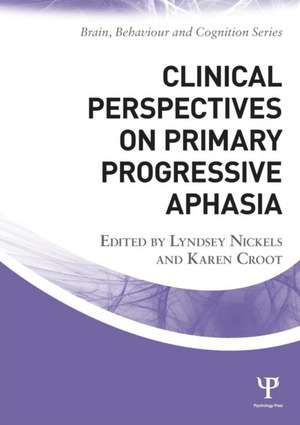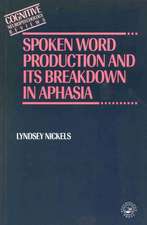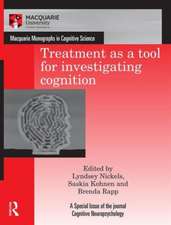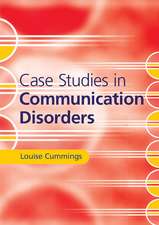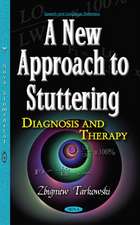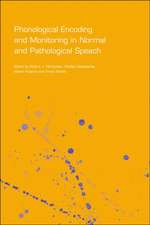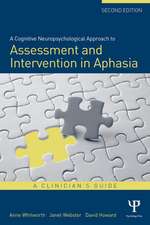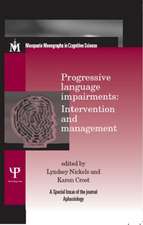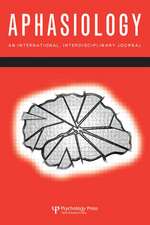Clinical Perspectives on Primary Progressive Aphasia: Brain, Behaviour and Cognition
Editat de Lyndsey Nickels, Karen Crooten Limba Engleză Paperback – 27 apr 2015
This book is suitable for a wide readership, from neurologists, geriatricians and other medical specialists, to general practitioners, speech and language therapists, occupational therapists, psychologists and students in these fields. It was originally published as a special issue of the journal Aphasiology.
| Toate formatele și edițiile | Preț | Express |
|---|---|---|
| Paperback (1) | 491.21 lei 6-8 săpt. | |
| Taylor & Francis – 27 apr 2015 | 491.21 lei 6-8 săpt. | |
| Hardback (1) | 1006.60 lei 6-8 săpt. | |
| Taylor & Francis – 27 apr 2015 | 1006.60 lei 6-8 săpt. |
Din seria Brain, Behaviour and Cognition
-
 Preț: 386.06 lei
Preț: 386.06 lei -
 Preț: 317.42 lei
Preț: 317.42 lei -
 Preț: 341.57 lei
Preț: 341.57 lei -
 Preț: 355.03 lei
Preț: 355.03 lei -
 Preț: 372.57 lei
Preț: 372.57 lei - 15%
 Preț: 428.65 lei
Preț: 428.65 lei - 41%
 Preț: 184.59 lei
Preț: 184.59 lei - 15%
 Preț: 456.25 lei
Preț: 456.25 lei - 30%
 Preț: 771.17 lei
Preț: 771.17 lei -
 Preț: 415.46 lei
Preț: 415.46 lei -
 Preț: 469.38 lei
Preț: 469.38 lei -
 Preț: 489.26 lei
Preț: 489.26 lei - 15%
 Preț: 466.77 lei
Preț: 466.77 lei -
 Preț: 488.29 lei
Preț: 488.29 lei - 15%
 Preț: 340.71 lei
Preț: 340.71 lei -
 Preț: 469.56 lei
Preț: 469.56 lei - 15%
 Preț: 434.88 lei
Preț: 434.88 lei - 5%
 Preț: 1413.62 lei
Preț: 1413.62 lei - 25%
 Preț: 772.36 lei
Preț: 772.36 lei - 16%
 Preț: 300.11 lei
Preț: 300.11 lei
Preț: 491.21 lei
Nou
Puncte Express: 737
Preț estimativ în valută:
93.99€ • 98.14$ • 77.62£
93.99€ • 98.14$ • 77.62£
Carte tipărită la comandă
Livrare economică 15-29 aprilie
Preluare comenzi: 021 569.72.76
Specificații
ISBN-13: 9781138853560
ISBN-10: 1138853569
Pagini: 284
Ilustrații: NO
Dimensiuni: 174 x 246 x 18 mm
Greutate: 0.5 kg
Ediția:1
Editura: Taylor & Francis
Colecția Psychology Press
Seria Brain, Behaviour and Cognition
Locul publicării:Oxford, United Kingdom
ISBN-10: 1138853569
Pagini: 284
Ilustrații: NO
Dimensiuni: 174 x 246 x 18 mm
Greutate: 0.5 kg
Ediția:1
Editura: Taylor & Francis
Colecția Psychology Press
Seria Brain, Behaviour and Cognition
Locul publicării:Oxford, United Kingdom
Public țintă
Postgraduate and ProfessionalCuprins
1. Introduction: Understanding and living with primary progressive aphasia: Current progress and challenges for the future Lyndsey Nickels and Karen Croot 2. Our journey with primary progressive aphasia Shirley Rutherford 3. Differential diagnosis of primary progressive aphasia variants using the international criteria Cristian E. Leyton and John R. Hodges 4. Biomarkers in the primary progressive aphasias Murray Grossman 5. The genetics of primary progressive aphasia Jonathan D. Rohrer 6. Longitudinal imaging and deterioration in word comprehension in primary progressive aphasia: Potential clinical significance Andreia V. Faria, Rajani Sebastian, Melissa Newhart, Susumu Mori, and Argye E. Hillis 7. The patterns of progression in primary progressive aphasia: Implications for assessment and management Michał Harciarek, Emilia J. Sitek, and Andrew Kertesz 8. Long-term follow-up in primary progressive aphasia: Clinical course and health care utilisation Lina Riedl, Dirk Last, Adrian Danek, and Janine Diehl-Schmid 9. Use of the Progressive Aphasia Severity Scale (PASS) in monitoring speech and language status in PPA Daisy Sapolsky, Kimiko Domoto-Reilly, and Bradford C. Dickerson 10. Motor speech disorders associated with primary progressive aphasia Joseph R. Duffy, Edythe A. Strand, and Keith A. Josephs 11. Grammatical impairments in PPA Cynthia K. Thompson and Jennifer E. Mack 12. Word retrieval therapies in primary progressive aphasia Regina Jokel, Naida L. Graham, Elizabeth Rochon, and Carol Leonard 13. Trouble and repair during conversations of people with primary progressive aphasia Cathleen Taylor, Karen Croot, Emma Power, Sharon A. Savage, John R. Hodges, and Leanne Togher 14. Dysgraphia in primary progressive aphasia: Characterisation of impairments and therapy options Naida L. Graham 15. Augmentation of spelling therapy with transcranial direct current stimulation in primary progressive aphasia: Preliminary results and challenges Kyrana Tsapkini, Constantine Frangakis, Yessenia Gomez, Cameron Davis, and Argye E. Hillis 16. Functional disability in primary progressive aphasia Claire M. O’Connor, Samrah Ahmed, and Eneida Mioshi
Descriere
Primary progressive aphasia is a type of dementia that progressively impairs language abilities and may eventually affect other aspects of thinking, movement and/or personality. For the person with primary progressive aphasia, these problems have a profound effect on their ability to communicate, which in turn impacts their relationships, social networks and ability to participate in everyday activities that depend on communication. This book provides an up-to-date survey of research relevant to the clinical care of people with primary progressive aphasia. It was originally published as a special issue of the journal Aphasiology.
